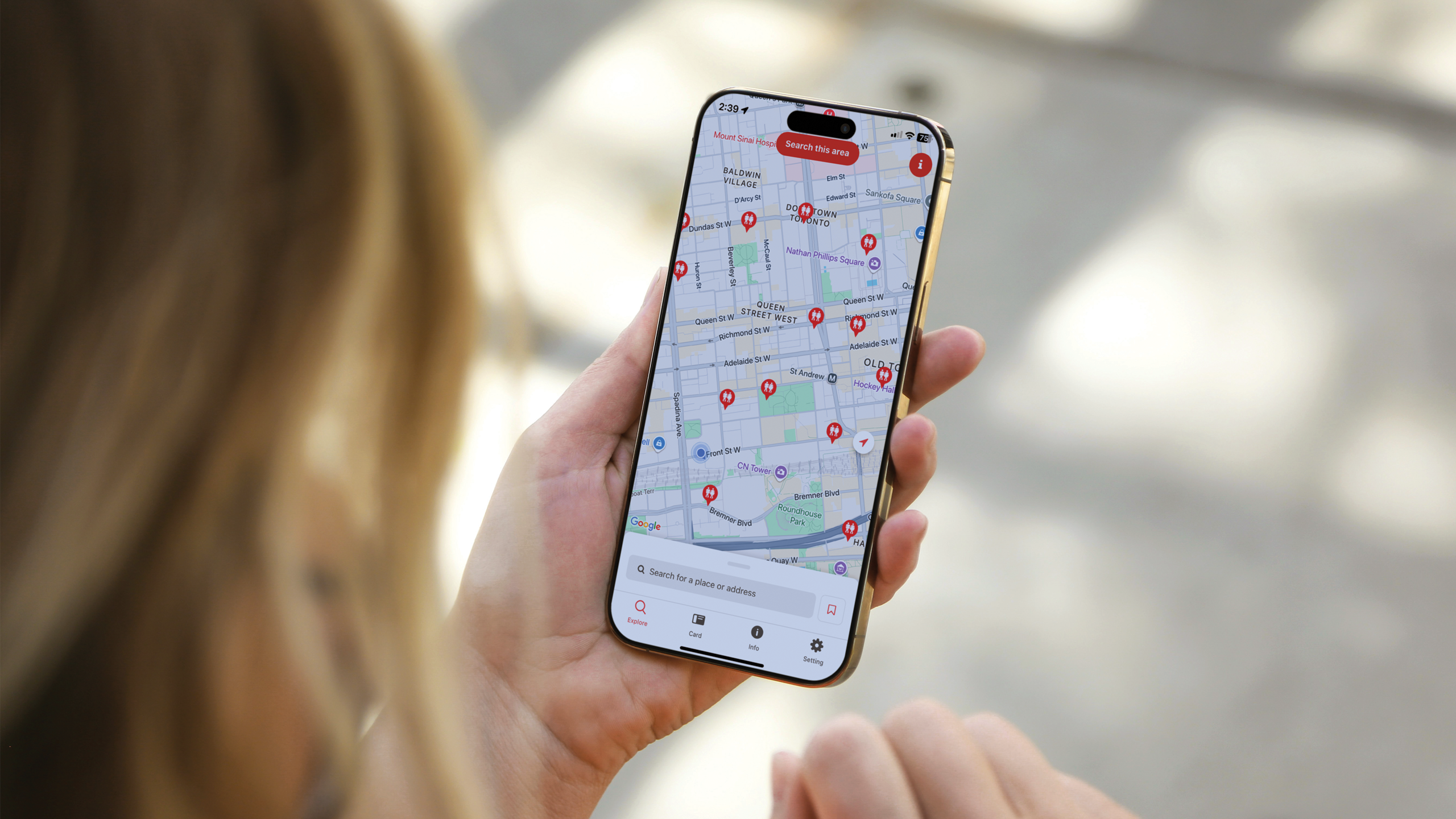What complex challenges can we help you navigate?
Email us:
health@thechangemakers.com

The Locked Out campaign faced several challenges to raise awareness for IBD and public washroom accessibility. The activation — a real portable toilet placed in a public space — often led to preconceived assumptions, mirroring the stigma those with IBD face when seeking washrooms. This reinforced the need for targeted engagement to shift perceptions.
Stigma remains a barrier, as understanding of IBD, its symptoms and patient experiences are often overlooked. Positioning the stunt within Crohn’s and Colitis Awareness Month and sharing educational information was essential to breaking down misconceptions. The campaign relied on knowledgeable event staff to effectively communicate the message, which was supported by QR codes, signage, and live app demonstrations to ensure accessibility and education.
Engaging passers-by required adaptable strategies to capture attention and encourage participation. Crohn’s and Colitis Canada’s network of advocates played a key role in staffing the event, providing credible voices to reinforce the campaign’s message. Maximizing visibility required a strategic mix of organic and paid social content, ensuring reach beyond the physical activation. Targeted media outreach focused on Toronto to optimize resources and drive coverage, reinforcing the campaign’s urgency and impact.
To effectively engage key stakeholders and promote the GoHere® app during Crohn’s and Colitis Awareness Month, we analyzed and applied existing research on the needs and challenges of those who live with IBD. It was important to understand disease prevalence and patient experiences to ensure our program resonated with audiences. We examined insights into public washroom access barriers, stigma, and the need for real-time solutions, ensuring our messaging addressed the most pressing concerns. We also leveraged Vividata research to deepen our understanding of audience behaviors and media consumption patterns. These insights guided our strategic approach, enabling us to craft compelling content, target key demographics, and maximize engagement across multiple channels.
IBD diagnosis rates in Canada are increasing – and so are the needs for support. There is no cure for IBD. Approximately 322,000 Canadians live with IBD, with new diagnoses every 48 minutes. Patients experience lifestyle impacts, including chronic abdominal pain, frequent bathroom visits, and fatigue.1 Addressing IBD requires a thoughtful, sensitive, and real approach to the stigma that patients experience. Our strategy balanced empathy with practical solutions to drive engagement and app downloads.
Additional research findings: IBD often develops in young adults, typically between 16 and 35 years old, but can occur at any age. A second peak may occur in individuals over 60. Both men and women are equally affected.1 Patients experience significant lifestyle and psychosocial impacts such as mental health, diet and nutrition, and work and social life; Psychiatric disorders frequently occur among those with IBD: An estimated 21% have clinical anxiety; and an estimated 15% have clinical depression.2
News and social media consumption habits: Mobile (hours per week)3: Gen Z: 16.8; Millennial: 10.1; Gen X: 12.8; Social applications (hours per week)3: Gen Z: 15.8; Millennial: 15.1; Gen X: 8.2; TV (hours per week)3: Gen Z: 14.4; Millennial: 17.5; Gen X: 16.5; Online (hours per week)3: Gen Z: 28.7; Millennial: 25.6; Gen X: 24.7.
Those who care for individuals who live with IBD, usually family members, close friends or partners of those diagnosed. Research revealed that 56 per cent of caregivers feel exhausted from caregiving duties, and 44% report anxiety.4 Women are more likely to take on the caregiver role for children with IBD.5 IBD caregivers in Canada are essential to the well-being of individuals living with the condition. We needed to show support for the care they provide and make them aware of the GoHere® app to increase downloads and usage.
Policymakers: Those who shape public policy and address issues through legislation and decision-making. For non-profit organizations, this audience can influence resources, support advocacy efforts and shape the broader environment in which Crohn’s and Colitis Canada operates. Engagement with policymakers was essential to raise awareness and garner support for washroom accessibility initiatives in a sensitive way to make it easy for this audience to share our messages. We needed a demonstration of local political support to increase awareness and action.
News Media and Social Media: We targeted top-tier health reporters, online news outlets, and Crohn’s and Colitis Canada’s active social platforms (FB & IG) to reach key audiences. Insights showed that Gen Z, Millennials, and Gen X spend significant time on mobile and social media, making a shareable, timely event essential. Personal patient stories highlighted the GoHere® app’s impact, driving awareness and downloads. Securing a national health reporter with a personal connection to IBD further amplified engagement within the IBD community.
Environmental Scan: To understand the IBD landscape, we reviewed media coverage and patient testimonials. Results showed IBD awareness remains low, and the stigma surrounding the disease often prevents open conversations. Public washroom accessibility and reduced stigma emerged as a critical need for IBD patients.

To reduce stigma, we had to find a way to visualize the realities of washroom access needs for those who live with IBD. To achieve this, we produced a powerful visual centerpiece – an ‘out-of-order’ portable toilet – representing the challenges faced by individuals with Crohn’s or colitis in accessing public washrooms quickly. Through earned and social media, this activation sparked conversation and action on the GoHere® app during Crohn’s and Colitis Awareness Month.

The campaign featured a high-impact public activation and a multi-channel communication strategy:
Call-to-Action: Event materials, earned and social media materials, and conversations encouraged attendees to scan the QR code and download the GoHere® app.
Event Execution: On November 26, 2024, we installed an ‘out-of-order’ portable toilet near Toronto’s Union Station to highlight the urgent need for accessible washrooms. Crohn’s and Colitis Canada staff and volunteers engaged the public with creative materials and a QR code for easy GoHere® app downloads.
Media Engagement: To broaden education beyond the event, we needed national media coverage for our story. This involved securing a nationally syndicated feature story, booking interviews for patient advocates and Crohn’s and Colitis Canada spokespeople, and sharing event photos with media outlets to provide audiences with the powerful visual to include in their stories.
Social Media Strategy: Organic and paid social media posts leveraged hashtags and influencer partnerships, and visual content from the event captured attention and drove app downloads.
Policymaker engagement: To amplify event support and impact, we engaged local MPs and MPPs to demonstrate their support. Mary-Margaret McMahon, MPP for Beaches-East York and Toronto City Councillor, Paul Ainslie, Scarborough-Guildwood, attended the event, shared on their social channels and encouraged GoHere® app downloads. This demonstration of local political support allowed for increased awareness and actionable items for local communities to consider.
Call-to-Action: Event materials, earned and social media materials, and conversations encouraged attendees to scan the QR code and download the GoHere® app.


These days, it is easy to focus on what is new. In fact, it can seem impossible to keep up. But the 2025 State of Public Relations in Canada Report shows us that in all this change, the fundamentals: trust, ethics, and purpose, still matter.
ChangeMakers supported this research initiative because it is deeply connected to what we do – helping organizations earn trust, build relationships and communicate with clarity. The report confirms what we hear from clients every day. People want honest, clear, and responsible communication. They trust organizations that truly listen and respond with relationships in mind. And they want professionals who understand both strategy and risk to help them move their goals forward.
The three themes in the report stand out for us. Each is tied to the work we do and the outcomes we help deliver.
First, trust is still fragile.
Public trust in communications is improving, but not fast enough. The language we use to describe our work in the professional field makes a difference. Titles like “communications” and “public relations” are not interchangeable in the eyes of the public, and it affects credibility. Words matter.
At ChangeMakers, we focus clear, honest communication. Whether we’re working with government, business or communities, we understand how to engage audiences, build relationships and earn trust. We believe reputation is earned through actions, not slogans.
Second, AI is here. We need to lead.
The report shows that while our professional field is looking at efficiencies in new AI tools, business leaders are not yet turning to their communications teams for guidance on AI strategy. That is a risk. If we stay focused on outputs, we will be left out of the bigger conversation.
If harnessed correctly, AI can be much more than a tool bolted on to workflows. It can be a strategic driver that creates both new risks and new expectations. At ChangeMakers, we are responding by embedding AI into every facet of our business. The delivery of this looks different across our paradigm, but the result is consistent – higher rate of efficiency, better quality output, and getting to the solution quicker and more often. All of this is grounded in our unfettered belief in human expertise at the wheel. We believe this approach will both elevate our company and push the boundaries of what’s possible for the entire industry.
Third, professional associations matter.
Canadians want ethical oversight. They want standards they can trust across all disciplines in the work ChangeMakers does, from marketing, creative and digital to advertising, communications, change management, engagement and measurement. That is what professional associations, like the Canadian Public Relations Society, bring to the table. Professional associations are vital platforms for leadership and help keep the focus on what matters: relationships, ethics and public trust.
ChangeMakers supported this research because our clients and their audiences are living these issues every day.
Whether it is misinformation, shifting expectations, or AI uncertainty, we help our clients anticipate those challenges, navigate complexity, and create results that matter. This report confirms that our work is more important than ever.
Let’s keep the conversation going.

Across industries, transformation is constant. If you’re not evolving, you may be left behind. But the difference between success and failure isn’t simply who adapts fastest or the most. Those who will emerge as leaders in today’s business environment will be those who embrace and drive change best.
That’s why communications teams can no longer afford to sit at the end of the decision chain to receive and act on a mandate—they must be present at the decision-making table, shoulder-to-shoulder with the C-suite. The communications function is capable of more than storytelling, media, and advertising if you allow it.
At ChangeMakers, we demand it.
For too long, communications has been the messenger—not a co-architect—of business strategy. The result is often reactive campaigns, fragmented programs, or missed opportunities.
We’ve entered an era that requires communicators to understand – and are given visibility into – the entirety of an organization and business context before executing on a task. Communications deliverables are a means to the end.
To achieve business outcomes, communications must be at the core. Whether advising on organizational design, reputation risk, or stakeholder trust, engagement must be strategic, intentional, and continuous. Otherwise leaders will fail to build the trust required to execute successfully.
That’s why our role at ChangeMakers extends beyond “telling the story” to building the systems and approaches that make stories credible. We’re helping set direction, identifying roadblocks, and supporting organizational changes to meet and exceed expectations. This requires effective integration—across disciplines, crafts, and technologies, both internally and externally.
Immeasurable strength comes from integrating the entire communications landscape — from marketing and brand strategy to crisis management, organizational change, and social-impact advisory. Our excellence across this diverse skill set gives us an unmatched perspective that informs our approach to every business challenge.
Communications can lead the next decade of organizational transformation. Doing so will require courage to collapse silos, to rethink traditional models, to show up in boardrooms armed not only with creative ideas, but with data, foresight, and strategic authority.
For CEOs, boards, and senior leaders, strategic communications must be viewed as a key driver in every plan to achieve business outcomes. It’s the force multiplier — aligning people on the why, increasing adoption and execution, protecting reputation, and unlocking growth. Whether you’re introducing AI, repositioning a brand, driving rapid growth, responding to a crisis or reputational risk, or delivering social impact at scale, success depends on your ability to bring people with you – and communications is the catalyst for success.
People across every organization are using some form of AI – whether it’s endorsed or not. At its best, AI offers a promise of net new solutions, efficiency, cost reduction and automation. Executed inconsistently, it risks eroding trust and value among stakeholders that matter most.
The most effective transformations pair data intelligence with human expertise — the ability to listen, interpret, give and take, and adjust. At ChangeMakers, we leverage technology to provide data and insight so our teams can focus on strategic counsel: shaping messages that move markets, align employees, or attract investors.
AI is embedded in how we analyze sentiment, forecast risk, and measure impact. It helps us measure what was previously immeasurable. Our Reputation Score can quantify your reputation, analyze how competitors compare, predict reputational risk, and identify avenues for future growth.
In another case, we’re going beyond talking with clients about how AI-powered tools like ChatGPT, Gemini, and Google’s AI Overviews change the way people find information. We’re proactively workshopping content strategies and messages that resonate across audiences and organizational contexts, and are structured so AI tools can find, understand, trust, and quote them.
No one person can keep up with the pace of change set by AI and technology. It requires partnership with a trusted advisor who can help you set the path and filter what’s valuable amidst the noise.
The pace of change today—technological, societal, regulatory—can feel overwhelming. Change is hard. And can be exhausting. Especially when poorly managed.
Organizations with strong change management deliver 264% more revenue growth than those that don’t. What does “strong change management” mean? Following a change management methodology is not enough. Leaders must leverage their strategic communications team to take organizational change beyond process and protocols to embed lasting shifts in culture, performance, and resilience that maximize success.
When done well, change builds credibility and confidence. When done poorly, it destroys both. Strategic communications is the difference.
At ChangeMakers, that’s our purpose and our promise: to help leaders and their organizations navigate complexity with clarity, integrity, and measurable results.
You can’t stop change. But you can do it well.

America’s hospitals are running out of time. Staffing shortages are closing clinics, emergency rooms are over capacity, and clinicians are leaving faster than new ones can be trained. Burnout, backlogs, and budget shortfalls are eroding the foundation of care. The system is strained and signaling the need for urgent change and decisive leadership.
At the same time, artificial intelligence (AI) tools are advancing quickly, promising to automate documentation, predict risk, and personalize treatment. Hospitals stand to reclaim thousands of clinician hours each year, reduce administrative costs, and ease burnout, improving access and efficiency across the system.
The American Medical Association has already warned that adoption could stall if hospitals fail to address clinician and patient concerns. Without thoughtful rollouts that build genuine trust, even the best technology may fall short, leaving significant investments with little real-world impact.
Hospital leaders can’t afford to miss — or mishandle — this moment. Smart organizational change management will determine whether we succeed with one of healthcare’s most transformative opportunities in a generation.
Before we ask patients and clinicians to adopt AI, we must answer why the change should matter to them. Talk about AI tools in terms of human outcomes that benefit the users, like more face-to-face time with providers and less burnout for clinician, rather than in business terms like “efficiency” or “innovation.”
For example: “We know how frustrating it can be when clinicians spend visits typing into a laptop instead of fully engaging with you. We envision a future where conversations are face-to-face, uninterrupted, and centered on your needs. That future is possible with the help of our new AI-powered documentation tool.”
Patients and healthcare professionals need to see that these technologies bring time back to them to help them achieve their goals. If healthcare leaders fail to demonstrate that purpose clearly and repeatedly, adoption will remain half-hearted.
Actions: Align the rollout of AI tools with end-users’ values and goals. Every staff meeting, town hall, and newsletter should connect technology to purpose.
AI in healthcare evokes legitimate fears — of inaccuracy, data sharing without consent, and the loss of human connection. These concerns are shared by both clinicians and patients. Ignoring them, or labeling skeptics as “resistant to change,” only guarantees greater resistance.
Clinicians don’t inherently reject technology, rather they question anything that might compromise patient care. Patients are no different; they want the best outcomes possible and are protective of their privacy. These concerns are indicators of where trust must be earned, and leaders who name fears early can shape the narrative before it shapes the AI initiative.
Hospitals must name and address these worries before they metastasize into distrust. Be transparent about what isn’t working today and show how AI tools can relieve those pain points. Create open forums for clinicians and patients to raise questions, and publish clear, honest answers. Treat skepticism as data revealing where design improvements, education, reassurance are needed most.
Actions: Build structured channels for feedback during pilot phases and early rollouts. Make it visible that concerns are understood and lead to change. Transparency is the currency of trust.
The biggest mistake leaders make is treating AI implementation as a checkbox. Real transformation takes time to test, adjust, and rebuild workflows.
It’s no different than inviting nurses, physicians and surgeons to test a new operating room layout before it is built into a new hospital. Hospitals must plan for adaptive rollout with visible iteration. Invite early adopters to become change champions by testing the technology, informing instruction and rollout, and sharing watchouts. The goal is sustainable progress. When patients and clinicians see that leadership is listening and adjusting, they engage with curiosity instead of compliance.
Action: Budget for iteration. Measure success by improved satisfaction, reduced burnout, and visible workflow efficiency.
AI has the power to give patients and clinicians back their most precious resource: time. But that future depends on decisions made today. If leaders don’t invest as deeply in building trust as they do in technology, the promise of AI will stall in the waiting room.
It’s time for leaders to stop asking “Is the technology ready?” and start asking “Are our people ready?”

Working with the BC Ministry of Social Development and Poverty Reduction (SDPR), we were brought on to design and lead province-wide engagement to inform an update to TogetherBC: BC’s Poverty Reduction Strategy. As part of the strategy’s legislation, it must be updated every five years. We designed a robust engagement program seeking to gather input specifically from people with lived and living experience of poverty across BC. This included regional Town Halls, small group sessions, an online survey, DIY conversation toolkit, and other tactics including working with the Minister to host roundtable conversations. To ensure accessibility and inclusivity, we built in measures including honoraria, translation and interpretation, counselling, wellness supports, and coverage of other costs such as transportation, childcare and food when necessary. The project engaged approximately 10,000 people across British Columbia, including approximately 12% identifying as Indigenous. We crafted a What We Heard Report which will be presented to government to inform an update to the poverty reduction strategy in 2024.
Situation
Based on extensive initial engagement in 2017-18, TogetherBC, British Columbia’s Poverty Reduction Strategy, was released in 2019 and sets a path to reduce overall poverty in BC by 25% and child poverty by 50% by 2024. With investments from across Government, TogetherBC reflects government’s commitment to reduce poverty and make life more affordable for British Columbians. It includes policy initiatives and investments designed to lift people up, break the cycle of poverty and build a better BC for everyone.
Targets, timelines, and accountability for TogetherBC are laid out in the Poverty Reduction Strategy Act. This act states that the strategy is to be updated every five years. To inform the update to the strategy, the Government of BC engaged us to design, facilitate and report back on what poverty currently looks like across BC and potential solutions to addressing it from the perspective of those with lived and living experience and community members.
COVID-19, the housing crisis, climate emergencies and inflation are some major local and global events that have significantly impacted British Columbians. Government needed to understand the experiences on the ground and how these events have impacted certain populations and issues in different ways, as well as solutions that are making a difference, new programs and services needed, and where government can prioritize over the next five years of the strategy.
Problem
Since the current government in BC came into power, more than 378,000 people have been lifted out of poverty, including 104,000 children. However, much of this can be attributed to COVID-19 relief supports from the federal government, as well as other temporary measures during the pandemic. Other important actions have been completed that are making a difference in reducing poverty, but for some groups, it is still not enough and challenges remain.
Hearing directly from people with lived and living experience was also a direct mandate of this engagement, which presents major challenges requiring innovative thinking to ensure accessibility and very low barriers to participation.
Solution
We designed and facilitated a comprehensive engagement program resulting in a What We Heard report summarizing all the input from throughout the engagement period. Engagement tactics for this project included:
To ensure accessible engagement options, we coordinated significant supports including the following:
Promotion of the opportunity to engage was conducted through widespread community outreach, including through organizations on the ground, digital channels, and ministry offices. A QR code and link to the engagement website was included on two rounds of income assistance payments, as well as the myselfserve.gov.bc.ca website where individuals can access their government assistance information.
Results
The project remained on time and on budget, despite a large scope with a higher than average amount of expenses. The project engaged approximately 10,000 people across BC, including:
8,337 survey responses, which included:

Working with the BC Ministry of Social Development and Poverty Reduction (SDPR), we were brought on to design and lead province-wide engagement to inform an update to TogetherBC: BC’s Poverty Reduction Strategy. As part of the strategy’s legislation, it must be updated every five years. We designed a robust engagement program seeking to gather input specifically from people with lived and living experience of poverty across BC. This included regional Town Halls, small group sessions, an online survey, DIY conversation toolkit, and other tactics including working with the Minister to host roundtable conversations. To ensure accessibility and inclusivity, we built in measures including honoraria, translation and interpretation, counselling, wellness supports, and coverage of other costs such as transportation, childcare and food when necessary. The project engaged approximately 10,000 people across British Columbia, including approximately 12% identifying as Indigenous. We crafted a What We Heard Report which will be presented to government to inform an update to the poverty reduction strategy in 2024.
Situation
Based on extensive initial engagement in 2017-18, TogetherBC, British Columbia’s Poverty Reduction Strategy, was released in 2019 and sets a path to reduce overall poverty in BC by 25% and child poverty by 50% by 2024. With investments from across Government, TogetherBC reflects government’s commitment to reduce poverty and make life more affordable for British Columbians. It includes policy initiatives and investments designed to lift people up, break the cycle of poverty and build a better BC for everyone.
Targets, timelines, and accountability for TogetherBC are laid out in the Poverty Reduction Strategy Act. This act states that the strategy is to be updated every five years. To inform the update to the strategy, the Government of BC engaged us to design, facilitate and report back on what poverty currently looks like across BC and potential solutions to addressing it from the perspective of those with lived and living experience and community members.
COVID-19, the housing crisis, climate emergencies and inflation are some major local and global events that have significantly impacted British Columbians. Government needed to understand the experiences on the ground and how these events have impacted certain populations and issues in different ways, as well as solutions that are making a difference, new programs and services needed, and where government can prioritize over the next five years of the strategy.
Problem
Since the current government in BC came into power, more than 378,000 people have been lifted out of poverty, including 104,000 children. However, much of this can be attributed to COVID-19 relief supports from the federal government, as well as other temporary measures during the pandemic. Other important actions have been completed that are making a difference in reducing poverty, but for some groups, it is still not enough and challenges remain.
Hearing directly from people with lived and living experience was also a direct mandate of this engagement, which presents major challenges requiring innovative thinking to ensure accessibility and very low barriers to participation.
Solution
We designed and facilitated a comprehensive engagement program resulting in a What We Heard report summarizing all the input from throughout the engagement period. Engagement tactics for this project included:
To ensure accessible engagement options, we coordinated significant supports including the following:
Promotion of the opportunity to engage was conducted through widespread community outreach, including through organizations on the ground, digital channels, and ministry offices. A QR code and link to the engagement website was included on two rounds of income assistance payments, as well as the myselfserve.gov.bc.ca website where individuals can access their government assistance information.
Results
The project remained on time and on budget, despite a large scope with a higher than average amount of expenses. The project engaged approximately 10,000 people across BC, including:
8,337 survey responses, which included:

Working with the BC Ministry of Social Development and Poverty Reduction (SDPR), we were brought on to design and lead province-wide engagement to inform an update to TogetherBC: BC’s Poverty Reduction Strategy. As part of the strategy’s legislation, it must be updated every five years. We designed a robust engagement program seeking to gather input specifically from people with lived and living experience of poverty across BC. This included regional Town Halls, small group sessions, an online survey, DIY conversation toolkit, and other tactics including working with the Minister to host roundtable conversations. To ensure accessibility and inclusivity, we built in measures including honoraria, translation and interpretation, counselling, wellness supports, and coverage of other costs such as transportation, childcare and food when necessary. The project engaged approximately 10,000 people across British Columbia, including approximately 12% identifying as Indigenous. We crafted a What We Heard Report which will be presented to government to inform an update to the poverty reduction strategy in 2024.
Situation
Based on extensive initial engagement in 2017-18, TogetherBC, British Columbia’s Poverty Reduction Strategy, was released in 2019 and sets a path to reduce overall poverty in BC by 25% and child poverty by 50% by 2024. With investments from across Government, TogetherBC reflects government’s commitment to reduce poverty and make life more affordable for British Columbians. It includes policy initiatives and investments designed to lift people up, break the cycle of poverty and build a better BC for everyone.
Targets, timelines, and accountability for TogetherBC are laid out in the Poverty Reduction Strategy Act. This act states that the strategy is to be updated every five years. To inform the update to the strategy, the Government of BC engaged us to design, facilitate and report back on what poverty currently looks like across BC and potential solutions to addressing it from the perspective of those with lived and living experience and community members.
COVID-19, the housing crisis, climate emergencies and inflation are some major local and global events that have significantly impacted British Columbians. Government needed to understand the experiences on the ground and how these events have impacted certain populations and issues in different ways, as well as solutions that are making a difference, new programs and services needed, and where government can prioritize over the next five years of the strategy.
Problem
Since the current government in BC came into power, more than 378,000 people have been lifted out of poverty, including 104,000 children. However, much of this can be attributed to COVID-19 relief supports from the federal government, as well as other temporary measures during the pandemic. Other important actions have been completed that are making a difference in reducing poverty, but for some groups, it is still not enough and challenges remain.
Hearing directly from people with lived and living experience was also a direct mandate of this engagement, which presents major challenges requiring innovative thinking to ensure accessibility and very low barriers to participation.
Solution
We designed and facilitated a comprehensive engagement program resulting in a What We Heard report summarizing all the input from throughout the engagement period. Engagement tactics for this project included:
To ensure accessible engagement options, we coordinated significant supports including the following:
Promotion of the opportunity to engage was conducted through widespread community outreach, including through organizations on the ground, digital channels, and ministry offices. A QR code and link to the engagement website was included on two rounds of income assistance payments, as well as the myselfserve.gov.bc.ca website where individuals can access their government assistance information.
Results
The project remained on time and on budget, despite a large scope with a higher than average amount of expenses. The project engaged approximately 10,000 people across BC, including:
8,337 survey responses, which included:



Novel molecules, innovative mechanisms of action, new indications, loss of exclusivity, drug shortages, reimbursement challenges, evolving models of care… and the list goes on.
At ChangeMakers Health, we help clients navigate today’s complexities and anticipate tomorrow’s challenges — all in service of improving care and creating better lives for patients.
We partner with pharmaceutical companies, healthcare organizations and patient advocacy groups. Together, we help patients access potentially life-saving and life-changing medications and treatments. We educate patients and the public about chronic conditions and treatment options. We work to strengthen our healthcare system — ensuring people receive accurate, empowering information to support informed care with our dedicated healthcare providers.
To find out more, or engage our team, email us at:
health@thechangemakers.com


Crohn’s and Colitis Canada
Senior Manager, Communications and Public Relations
Meaningful change is not possible without collaboration because trust is foundational to great work. Our goal is to become an extension of your team, building a strong and lasting relationship






Email us:
health@thechangemakers.com



The field of public engagement continues to evolve—especially in the context of complex, high stakes decision making.
For more than 25 years, the IAP2 Spectrum of Public Participation (the Spectrum) has served as the cornerstone framework for how public participation is understood, practiced, and evaluated across sectors and geographies.
ChangeMakers has been proud to support IAP2 Canada in contributing to the global evolution of the IAP2 Spectrum by designing and hosting engagement to bring Canada’s voices, values, and practices to the table in shaping the next version of this foundational tool.
Why We Engaged
You can’t change your field without engaging your field.
As engagement professionals, we are no strangers to navigating change, but we also know that change can be challenging. Engaging practitioners meaningfully on the Spectrum required opening space for reflection, conversation, and collective insight within our field.
As a strategic partner to IAP2 Canada, ChangeMakers led the development of a national Thought Exchange survey, interviewed interest holders, and convened practitioners at the IAP2 North American Conference in Ottawa to gather insights, test language, and surface tensions about the Spectrum.
We asked: How should the Spectrum serve our field and the public for the next 25 years? What is working well? Where is it holding us back? Does everyone see themselves reflected in the spectrum process?
What We Learned, and What It Means
Our engagement surfaced a wide range of perspectives on the Spectrum – some saw it as a vital tool for managing expectations and engaging effectively, while others found it limiting or felt it no longer reflects the realities of their communities. Bringing divergent viewpoints together was essential to ensuring that any changes explored reflect a breadth of needs and experiences.
This process deepened our understanding of what is at stake. The Spectrum is more than a visual in an engagement plan—it’s a signal to the public about how their voices will be treated, and a tool for institutions to build legitimacy in their decision-making processes. That power demands accountability, adaptability, and clarity.
What’s Next?
When IAP2 International publishes the updated Spectrum, ChangeMakers will be among the first to renew and refine our internal approaches to align with this evolution in the practice of engagement to meet the public’s expectations, and we will help our clients do the same.
Our call to action is: Be bold in your field. Engage with your peers to explore the possibilities of change. Be excited to innovate and push your practice while being open to hearing others’ experiences and perspectives — because that is where deep insights, great ideas, and shared solutions emerge.We’re proud to be part of a growing, global community of public engagement practitioners and to be playing a key role in advancing this important work.
Are you reflecting on your organization’s approach to engagement and how it can be most impactful in creating or navigating change? Or are you stumped by a particularly complex project? Reach out, we’d love to chat.
About the Authors
Sarah Chau Bradley / Director, Engagement, Strategic Communications
Sarah is a communications and engagement professional with expertise in tailored consultation for diverse urban communities. She brings ten years of experience from the private, public, not-for-profit, and philanthropy sectors and strives to create spaces for engagement that are welcoming, inclusive, and culturally relevant.
Rhianne Fiolka / Manager, Engagement and Communications
Rhianne Fiolka is a Manager of Engagement and Communications at ChangeMakers, specializing in urban planning, equity, and accessibility-related projects. Rhianne is passionate about Equity, Diversity, and Inclusion (EDI), facilitating authentic conversations, and promoting social justice.
Chrystiane Mallaley / SVP, Engagement
Chrystiane is a long-standing IAP2 member and leads ChangeMakers’ Indigenous, Public, and Interest Holder Engagement Services. She partners with Indigenous and non-Indigenous governments, businesses, not-for-profit organizations and communities to strengthen relationships and create meaningful engagement on complex projects and policy challenges.
ChangeMakers offices and team members are located across North America within the traditional, Treaty, and unceded territories of First Nations, Inuit, and Métis Peoples.
Our team is currently engaged in the development of a Truth and Reconciliation Action Plan for our company. The Truth and Reconciliation Commission of Canada called upon the corporate sector in Canada to “adopt the United Nations Declaration on the Rights of Indigenous Peoples as a reconciliation framework and to apply its principles, norms, and standards to corporate policy and core operational activities involving Indigenous peoples and their lands and resources” (Call to Action 92).
Our Action Plan is an important measure we are taking as a company and we look forward to updating with more information about this plan and the actions that reflect our commitments as a team.